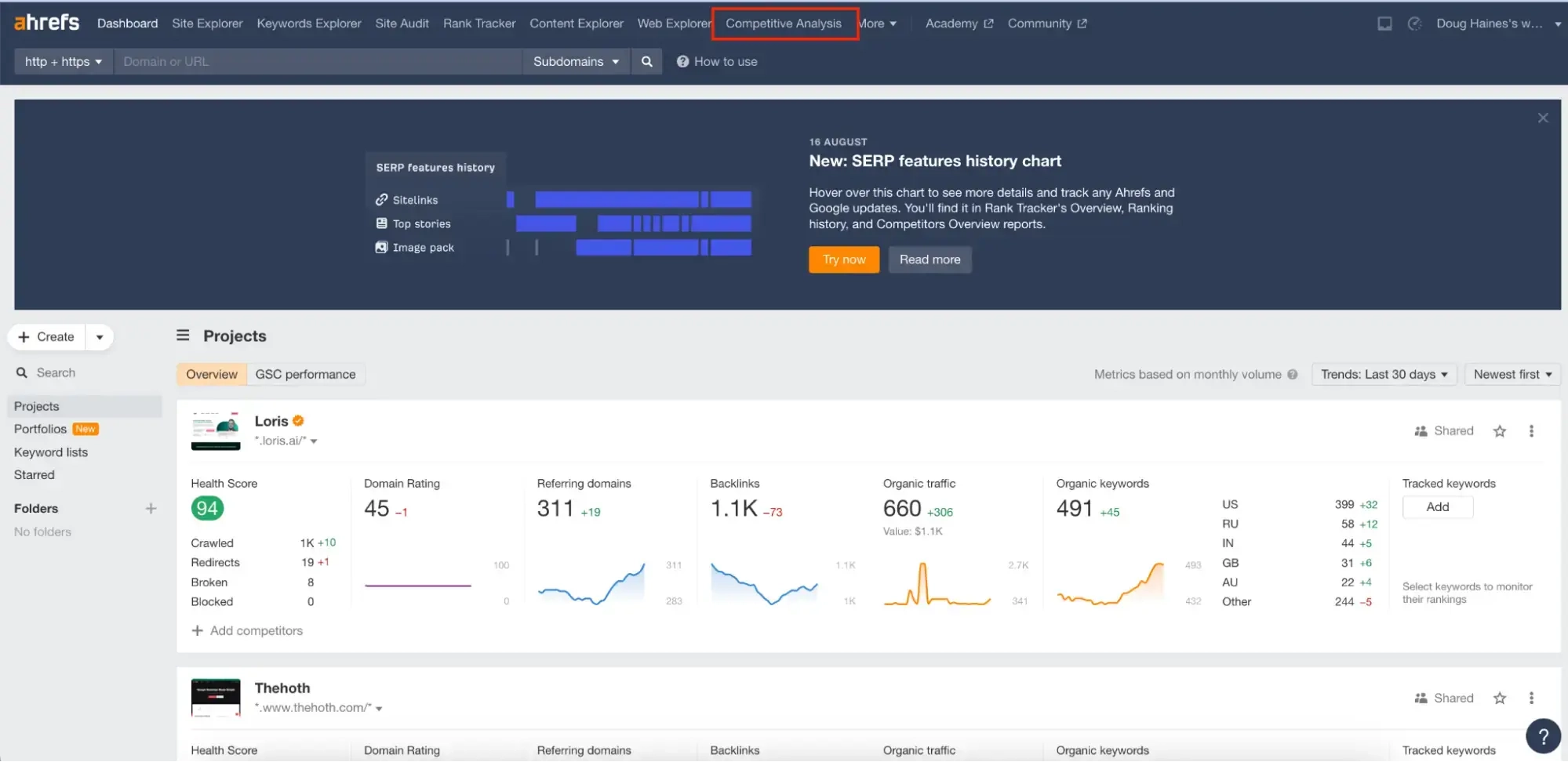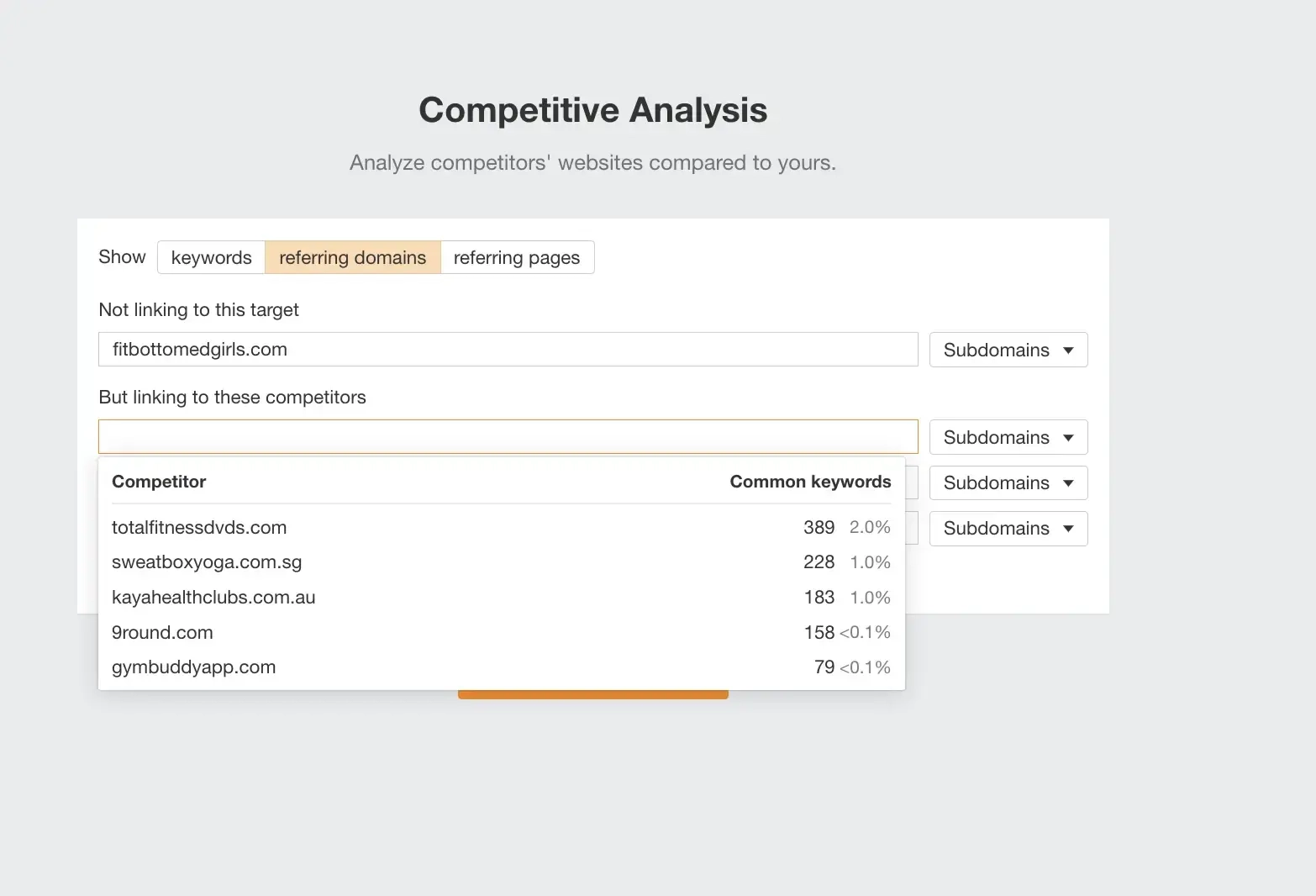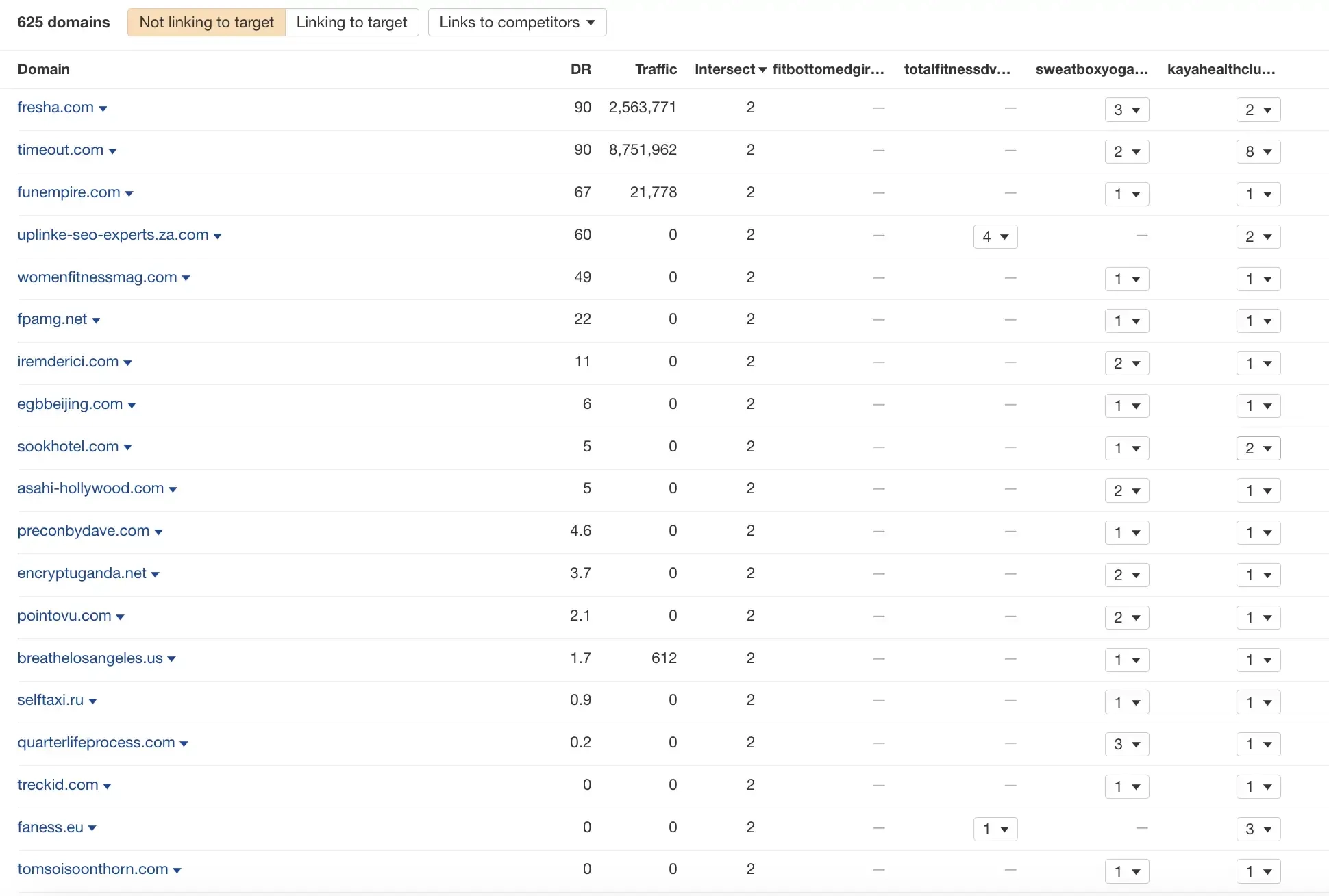
If you’re looking for a way to gain backlinks, drive organic traffic, and improve your website’s ranking, quality niche edits are an effective link-building strategy.
Also known as “curated links” or “contextual backlinks,” niche edit links are created by adding a backlink to existing, relevant websites within your niche or industry.
For example, if you run a fitness blog, you might reach out to an established fitness site and ask for a link placement in an existing blog post.
Niche edits work well because they leverage content that’s already established and relevant. This saves you time you would otherwise spend putting together guest posting pitches and creating new content.
In one study that analyzed 34 websites that received at least three backlinks from niche edits, 24 of the domains saw organic traffic growth of 70%, proving that niche edits are still an effective link-building technique.
If you’re looking for a way to earn relevant, authoritative, and high-quality links, niche edits are an excellent place to start.
In this guide, we’ll cover everything you need to know about niche edits and whether they’re still effective for building links and boosting your search engine optimization (SEO).
What Is a Niche Edit?
Niche edits rely on existing content to build links rather than creating new, relevant content.
One case study found that strategically placed niche edits have a 70% success rate in earning high-quality backlinks from authoritative sites.
There are two main stages to niche edit link building:
Find existing posts or other content on other people’s websites that are high quality and relevant to your business or niche.
Approach website owners and ask them to place a link to your website in their existing blog post or content.
Building relationships with site owners is crucial if you want to achieve a niche edit. Genuine connections with webmasters can open doors to earning valuable links within relevant content, although this process often requires patience.
Sometimes, a financial incentive might be necessary to persuade a website owner to edit their content and incorporate your link. This renders it a paid link.
According to the guidelines in Google Search Essentials, paying for links is not permitted, so you’ll need to be careful when offering to pay for niche edits:
The example below is a resource page by marketing automation platform Hubspot. Let’s say one of the resources listed reached out to Hubspot to ask that they be included on its list. This would be considered a niche edit:
💡 Guest posts versus niche edits
Guest posting is a link-building process that involves creating original content for another website in exchange for backlinks to your site.
Niche edits do not typically require you to create new content, they simply involve finding existing, relevant content and asking the website owner whether they would be willing to add contextual links that point to your site.
Both link-building tactics are important parts of a comprehensive strategy.
| Guest Posts | Niche Edits |
|
|
If you’re looking for quick results and have built relationships with website owners who have established sites, niche edits are the way to go.
Are Niche Edits White Hat?
This is something that has been widely debated in the world of SEO. Let’s unpack what this means:
What is white-hat SEO?
White-hat link-building practices align with Google’s Search Essentials guidelines (formerly Webmaster Guidelines) and provide value to readers.
Ethical, white-hat niche edits are those that are:
👍 Relevant
The backlinks should be on the same subject as the content they link to or a related one.
For example, it makes sense for a guitar shop to link to a guitar teacher but not a legal firm.
👍 Organic
Links from white-hat niche edits should be acquired through genuine relationship-building efforts and outreach. Your focus should be on developing mutually beneficial connections to secure links naturally.
👍 High-quality and valuable
White-hat niche edits provide additional resources or information to readers. They should also improve the quality of the content they’re placed in.
What are Black-hat niche edits?
Black-hat niche edits are unethical or manipulative links that are inserted into existing content on third-party websites, typically done without the site owner’s knowledge or permission.
They violate search engine guidelines and can result in penalties if discovered. Common types of black-hat niche edits include:
Hacked links: Inserting links into websites that have been hacked or compromised. This is often done at scale using automated tools or malware, which is malicious software.
Expired domain hijacking: Buying expired domains with existing backlinks and repurposing them to insert paid links without relevance or context.
Backdoor access: Collaborating with rogue authors, editors, or developers who have access to a site and can insert links secretly.
Comment or code injection: Adding hidden links in HTML comments, widgets, or footers without the site owner noticing.
Black-hat niche edits violate Google’s guidelines, offer no editorial value or contextual relevance, and can damage your brand’s reputation and search visibility.
The Advantages of Niche-Edit Backlinks
Let’s unpack the benefits of niche edits for your business:
✅ Relevance
Niche edits give you an opportunity to earn links in high-quality content that is relevant to your business.
The niche-editing process involves targeting websites relevant to your niche or industry. This increases the likelihood of receiving high-quality traffic from users who are genuinely interested in your product or service.
Gaining relevant links also benefits your backlink profile and can signal to Google that your website is authoritative and worth ranking in its search results.
Low relevance is one of the top red flags for link builders when deciding on link quality, followed by bad neighborhoods and poor SEO metrics.
✅ Authority
When choosing which websites to target in your niche edit outreach, you should opt for sites that already have authority and are trusted by search engines.
Gaining a backlink from a piece of content with decent authority means some of it gets passed on to your website.
This passing on of authority is known as acquiring link juice, and it helps improve your website’s ranking in search engine results pages (SERPs).
Because the number one result on Google has an average of 3.8 times more backlinks than positions two to ten, building authoritative backlinks is vital.
✅ Organic and referral traffic

A backlink pointing to your website from a quality website can drive organic referral traffic to your site. A high-quality website has good organic traffic, is relevant to your niche or industry, and publishes well-written content.
Niche edit links are placed in content that's closely related to your business, so the people who click on the content are more likely to be genuinely interested in what you offer. This increases the chances of turning those visitors into paying customers.
In one study of 96 URLs from 11 domains, over 73% of the domains saw increased traffic, and 12% saw stable traffic.
✅ A diverse backlink profile
Having a diverse backlink profile, which means having inbound links from various sources, can do wonders for your search engine rankings.
Whether you create niche edits or use other link-building strategies, building a diverse backlink profile should be a key part of your link-building strategy.
✅ Affordability
Compared to some other techniques like guest posts or broken link building, niche edits are cost-effective.
Spending countless hours creating guest posts or paying content creators to do it can quickly become expensive. When you create niche edits, you can leverage existing articles to build backlinks.
✅ Speed and scale
Niche edits are much faster to implement than other methods, such as creating new content for a guest post.
Creating niche edits means you don’t have to create content and wait around hoping someone will link to it. Instead, you proactively seek relevant content to help you build your backlink profile quickly.
If you decide to put money behind your request, website owners will likely react faster, so your link-building efforts will pick up speed.
✅ Ideal for difficult pages
Niche edits are a great way to build links in highly competitive industries such as personal finance. No matter what industry you’re in, you might have some service-based or informational pages you may want to link to through niche edits.
The Disadvantages of Niche Edit Link Building
As with any other link-building strategy, there are some downsides to building niche edits.
❌ Some websites won’t accept payment
Some website owners simply can’t be bought. Instead, you’ll need to find ways to prove how your link will benefit them and their audience.
Many sites work hard to stay on the right side of Google’s guidelines, so they practice caution when placing outbound links to other websites in their content.
This means you’d need to deliver a polished pitch that clearly communicates the value your link will provide. These pitches can be difficult to produce, and you’ll have to develop original content if you want publications to link to your website.
❌ Quality becomes a slippery slope
Sometimes link builders get sloppy when doing niche edits. If you don’t carefully vet websites, you may end up paying for low-quality links.

How to Build Quality Backlinks with Niche Edits
Now that you know more about niche edits, let’s look at how to build these to earn high-quality, authoritative backlinks.
First, you need to identify websites and content that you want your inbound link placed on. You’d need to do some research and analysis to find the websites you want to target with your outreach tactics.

Let’s imagine you own an e-commerce business that sells fitness equipment online. This guide will walk you through the process of securing niche edit links, using the fitness niche to illustrate each step:
1. Find potential partner sites
First, you must identify high-quality websites and content to which you want your inbound link added.
You’ll need to research and analyze to find relevant linking opportunities. Here’s what you should consider when looking for potential partner sites:
👍 Domain authority (DA)
Domain authority (DA) is a metric developed by the SEO tool Ahrefs to measure a website’s authority. Aim for websites with a good DR. You don’t need to only target websites with DRs in the 80s or 90s, but ensure it’s equal to or higher than yours.
Let’s say you’re a social media marketing news site, and your DR is around 80. A good site to target for a niche edit would be the social media management tool Buffer, as their DR is 91:
On the other hand, if your social media news website has a DR of around 50, you could aim for a niche edit on the social media automation tool Socionator’s website:
👍 Relevance
A link from a site within your industry or a closely related field will be more valuable than one from an unrelated site.
If you sell fitness equipment, a link from a health and wellness blog is more beneficial than one from an office furniture supplier.
👍 Backlink profile
Evaluate the site’s existing link profile to ensure it’s not spammy. Sites with a clean, well-maintained link profile are less likely to trigger search engine penalties.
Three ways you can identify potential partner sites
Here are some things you can do to find target sites within your niche:
💡 Use your knowledge of your industry
Leverage your understanding of key players, popular blogs, and authoritative websites within your niche.
This insider knowledge will help you quickly identify potential sites that are both relevant and respected in your industry.
💡 Use Google search operators
Google search operators can help you pinpoint relevant websites for your niche edit outreach. These refine your search results and allow you to identify suitable sites to target.
Start with simple operators to narrow down your search:
"Keyword": Enclose your primary keyword in quotes to search for exact phrases. For example, searching for "fitness equipment reviews" will return results that include that exact phrase.
site: This operator helps you search within a specific website or domain. For example, site:health.com "fitness equipment" will return pages from Health.com that mention fitness equipment.
intitle: Use this operator to find pages with your keyword in the title. For example, intitle:"home workout gear" will bring up articles where "home workout gear" is in the title.
Then, to refine your search even further, combine multiple operators to uncover the most relevant websites.
An example could be: intitle: + inurl: This combination is useful for finding niche blogs; intitle:"fitness tips" inurl:blog will find blog posts with "fitness tips" in the title and "blog" in the URL.
💡 Perform a competitive analysis
Ahrefs’s competitive analysis tool compares the backlink profiles of multiple websites (usually your competitors) to identify domains that link to them but not to your site.
This gives you a list of sites that are likely to be interested in content similar to what you offer.
To perform an analysis, click ‘Competitive Analysis’ on the navigation bar:
Let’s imagine you own an e-commerce business that sells fitness equipment online.
This guide will walk you through the process of securing niche edit links, using the fitness niche to illustrate each step.

Click on ‘referring domains’ in the top tab. Then, type in your website URL. If you know who your competitors are, you can add their URLs, too. Otherwise, you can select your top competitors from Ahrefs’ suggestions:

Now you can see all the websites that link to your competitors but not to yours. These websites are great targets for your niche link-building efforts:

2. Identify linkable content
Once you’ve found potential partner sites, you’ll need to go through your content to identify what might be link-worthy.
We suggest dividing your content into different categories to streamline the outreach process. If you sell fitness equipment, your content categories might look something like this:
👍 Educational content
These could be guides, how-tos, or in-depth articles on fitness topics or equipment.
Here is a good example of educational content that is linkable content because it provides value to the reader and is well positioned as a linkable resource:
👍 Product pages
These could be high-value product pages that offer detailed descriptions, user reviews, and strong calls to action.
Below is a product page that displays good content that website owners or bloggers may be interested in linking to:
👍 Resource lists
Resource page niche edits are curated lists of fitness tools, apps, or equipment you sell, such as “Essential Gear for Home Workouts.”
Here’s a resource page on the best gym equipment for creating a home gym:
3. Create new content
If your existing content doesn’t match the type of articles you want to target for niche edits, consider creating new content. Over 90% of marketers use new content pieces as their main way to generate more backlinks.
To build content for niche edit links, you would use a similar approach to the skyscraper method.
Skyscraper link building involves finding popular content that has been linked to by other sites and working to create an even better piece of content to replicate your competitor’s backlinks.
In this case, instead of building on existing content, you would tailor your content to the websites you want to target.
For example, if you find an article ranking well for At-Home Workout Routines, you might want to create a new blog post on Top Fitness Equipment for Effective At-Home Workouts.
This content would be an excellent addition to the existing article, which puts you in a good position to ask for a link insertion in the original article and earn a niche edit.
4. Find email addresses
Once you've identified the websites where you'd like to place your niche edit links, the next step is to find the contact information of the site owners or content managers.
Start by exploring the website itself. Many sites include contact details in easily accessible places, including:
The site’s contact page: Look for a "Contact Us" page, which often lists general contact emails or even direct emails for specific departments.
Author bios: If the content is authored by a specific individual, check their bio section for an email address. This information is often found at the beginning or end of a blog post.
Footer or About Page: The footer of a website or the "About Us" page frequently includes contact information such as email addresses or links to contact forms.
If you can't find the email address on the site, tools like Hunter.io, VoilaNorbert, or Cognism can help you find contact information. You can also try to search for people on LinkedIn who work for the company.
5. Send outreach emails
Webmasters are inundated with convoluted and confusing emails requesting link opportunities all day.
Deliver a clear and concise email showing them exactly what page you want the link on and what page you want them to link to, along with your preferred anchor text.
You’ll also want to be crystal clear about your value proposition and any payment that will take place.
If you don’t receive a response, follow up after a few days. If you still don’t get a response, it’s best to move on to other prospects.
💡 Pro Tip: Don’t Use a Branded Email Account
Using a non branded email account helps protect your company’s reputation in case your outreach efforts are misinterpreted.
Link-building activities, especially those that involve niche edits, can sometimes be viewed skeptically. By not using a branded email, you reduce the risk of negative associations being linked back to your brand.
A branded email would be [email protected], whereas a non-branded email would be something more personal like [email protected].
Below is an outreach email template you can use for building your niche edits:
Hi [Name],
I came across your article on "[Article Title]" (URL: [insert page URL]) and thought it was a great resource, especially the part about [mention a specific section or point briefly].
I was wondering if you’d be open to adding a helpful reference link to the section that discusses [brief context]. I have a relevant guide on "[Your Topic]" that I think would provide real value to your readers.
Here are the details:
Page I'd love a link on: [insert their URL]
URL to link to: [your link]
Preferred anchor text: [your anchor text suggestion]
Of course, I understand this takes time. I'm happy to offer a small editorial fee of $[amount] for your effort.
Let me know what you think, and thanks for considering!
Best regards,
[Your Name]
[Your Website]
[Your Email]
6. Negotiate payment
To maintain an ethical approach to niche edits, you must be completely transparent about payment and avoid engaging in deceptive practices that could harm your website or reputation.
When it comes to price, we recommend negotiating 50% of the website owner’s original asking price and letting them know you can issue payment via PayPal as soon as you receive their information.
Niche edits can quickly go awry if you offer money to the wrong person or if your link placement appears unnatural.
If you’ve agreed to pay a website owner to place your link in their content, our advice is to follow up with them regularly until your link is secured.
Get Niche Edit Links with a Professional Backlink Service
As you now know, niche edits are an excellent way to build diverse and relevant backlinks.
Niche edits should be part of any comprehensive SEO strategy, along with other link-building techniques like broken link building, guest posting, and resource page link building.
Although niche edit requests might sound simple enough, it’s easy to get this process wrong. Always err on the side of caution to ensure your link-building practices are ethical, that you target reputable websites, and that your SEO efforts don’t come across as trying to manipulate search engines.
For this reason, we recommend working with a professional agency like Linkbuilder to deliver a niche edit service that is completely ethical and transparent.
Contact Linkbuilder today to learn more about our link-building services and how we use niche edits to help our clients generate backlinks that boost their brands.


